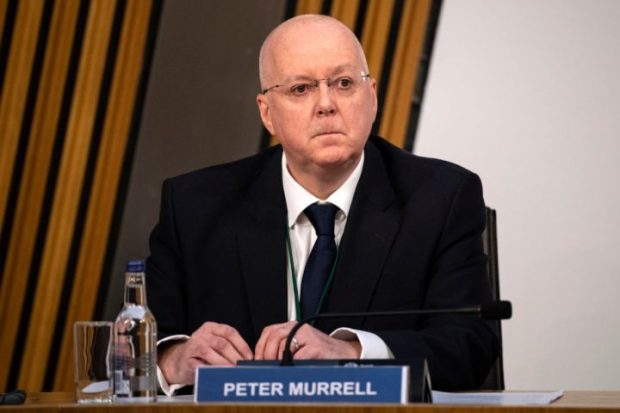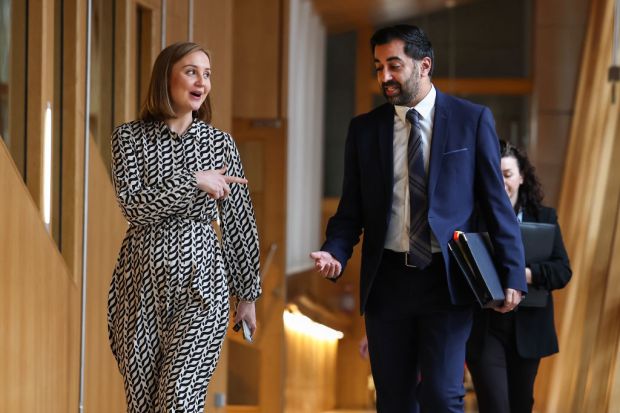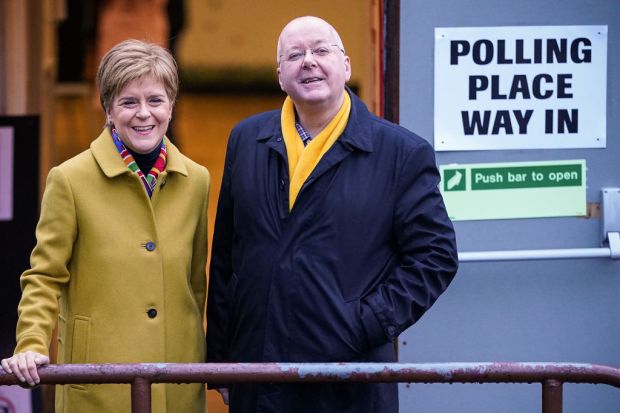I’m a big fan of Star Trek. Something to do with being raised on a heavy diet of sci-fi, leading to my overly optimistic outlook and faith in unions and federations.
For those less familiar with the sci-fi staple, the series often has episodes that take key crew members into alternative, dystopian futures to provide an opportunity to change the present or prepare for a coming event.
With that in mind, bear with me and fast-forward to 8 May: the votes from the Holyrood election have been counted and the SNP has won a majority in the Scottish Parliament. A letter has been issued to Number 10 demanding a Section 30 order, the constitutional mechanism that permits another referendum on ending the United Kingdom.
The government’s initial response will be the right one: ‘No, not now; the Covid recovery comes first’. As we know, less than one-fifth of Scots thinks separation is a top priority. This blunts the SNP’s momentum and sticks a bung in the nationalist pipework. However, it’s not long before the pressure begins to build and the majority of people in Scotland who believe they should have the right to have a referendum (even if they don’t support one at this moment) start to be drawn to the SNP’s siren song of separatism.
In this alternative future, the Nationalists launch their strategy of ‘grievo-max’, sending more letters and passing more motions against the UK Government than even the most robust civil service can absorb. Devolutionists and the tired defenders of a federal UK batter the UK Government with articles, interviews, and debates in Parliament lamenting the fall of the UK and the failure of the Conservatives and the government. These people have the best of intentions but, more importantly, they have the effect of being a vanguard for the nationalist narrative that Britain is broken and cannot be repaired.
So, what does the UK Government do next? If it followed my recommendation, it would do something radical: it would agree with the nationalists. Agree that the current devolved set up is dysfunctional and change is needed. Acknowledge that the majority of people in Scotland do not support the Conservative Party, but nor do they want to see a referendum in the near future. In response, the UK Government proposes a different course of treatment: localism.
During its 14-year tenure, the SNP has starved Scottish councils of cash and powers, centralising and exerting more direct control, even when local authorities vote for more autonomy and the freedom to make their own choices. Ask any Shetlander and they’ll tell you: far-off Holyrood is at least as bossy and high-handed as Westminster.
Rather than ignore the problem, in this future the UK Government steps up. It mobilises the Whitehall machinery to revise the Smith Commission, the 2014 panel that devolved further powers to Holyrood, so that local councils and communities get more powers directly from Edinburgh, Cardiff and London. And, crucially, that they get them swiftly and efficiently.
This may mean looking at passing more funding directly to councils based on UK-wide assessments of need or deprivation, and opportunities for local councils to take part in UK programmes as well as those provided by the devolved administrations. The SNP will scream ‘power grab’ but when community leaders start having more levers to improve long-neglected areas, the narrative on the ground starts to change.
The UK Government then goes further – it finalises the arrangements of intergovernmental machinery, making it crystal clear how each level of government (local, devolved and national) can work together and how councillors, MSPs, MSs and MPs can make their voices heard.
To enshrine these new developments, the government proposes a new Youth and Opportunities Bill that includes provisions for a national civic education programme in which every student in all four parts of the UK is taught about how modern government works. The content would be standardised across the UK, politically neutral and provide young people with the facts to make up their own minds. The Bill also includes new opportunities for non-military national service through the Foreign, Commonwealth and Development Office, non-governmental organisations, and other community groups — all funded by the UK Government.
Finally, the government puts its package of proposals before Parliament and ensures Scottish, English, Welsh and Northern Irish MPs have ample opportunity to explore and debate them, before passing them to a grand committee stage that includes the devolved legislatures. The UK Government is firm, but fair: all parts of the UK matter and, at the heart of it all, is the UK Parliament and its MPs from every corner of the country, united in common interest and challenge.
The nationalists scream and shout about moving the goal posts, but the people of Scotland and the rest of the UK will at least want a chance to hear the new proposals before plunging into the division of a second referendum in the middle of our country’s recovery from Covid-19.
All of a sudden, there is a flash, a clicking of fingers, and we’re back in April. There are still several weeks of campaigning ahead and Douglas Ross and Anas Sarwar, leaders of the Scottish Conservatives and Scottish Labour respectively, can still make the gains necessary to deny the SNP their coveted majority. Phew.
Yet, as every good Trekkie knows, we wouldn’t be given a glimpse of the future if there wasn’t something that could help our thinking in the present. The Union and its supporters need not — should not — be constantly on the defensive. They should stop allowing nationalists a monopoly in the ideas economy. The United Kingdom has endured this long because it has been as adaptive to change as it has been wedded to tradition. To secure the future of the Union, the UK Government should boldly go where no government has gone before.
Got something to add? Join the discussion and comment below.
Get 10 issues for just $10
Subscribe to The Spectator Australia today for the next 10 magazine issues, plus full online access, for just $10.




















Comments
Don't miss out
Join the conversation with other Spectator Australia readers. Subscribe to leave a comment.
SUBSCRIBEAlready a subscriber? Log in